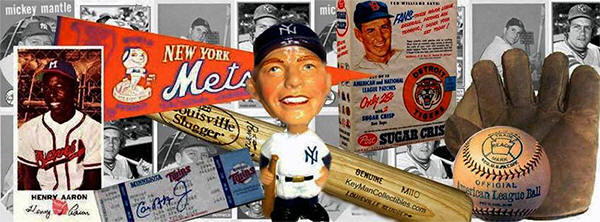| |
Ted Williams, "The Kid", "The
Splendid Splinter", "Teddy Ballgame".
The last .400 hitter, 6 batting titles,
two Triple Crowns, and a pair of MVP
Awards. Achievements interrupted with
three years of voluntary service in
WWII, and the Korean war. This month we
spotlight Ted Williams Baseball
memorabilia.
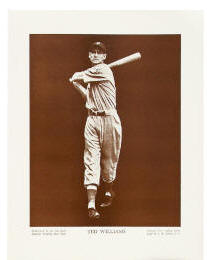 Designated
M113 and M114 by the American Card
Catalog,
Baseball Magazine Company premium
posters were issued between 1910
and 1957. The blank-backed sepia tone
photographs were taken by legendary
sports photographer Charles Conlon.
Printed on semi-gloss high quality
paper stock, the "Art Posters" were
made available through an offer printed
in the magazine. Designated
M113 and M114 by the American Card
Catalog,
Baseball Magazine Company premium
posters were issued between 1910
and 1957. The blank-backed sepia tone
photographs were taken by legendary
sports photographer Charles Conlon.
Printed on semi-gloss high quality
paper stock, the "Art Posters" were
made available through an offer printed
in the magazine.
The bottom center has the players name, the lower left reads "Published by
the Baseball Magazine Company, New
York" and the lower right reads
"Enlarged from an original photograph
by C.M. Conlon, NY"
This M114 Ted Williams poster was issued in 1939. Another pose, photo
taken by WM. C. Greene, was issued
around 1949. Between the two poses
there were a number of variations,
including a Washington DC address,
issued in 1954.
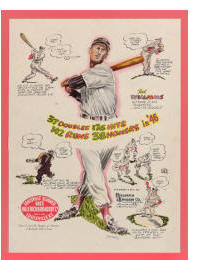 Presented by Hillerich & Bradsby in
1947, this
Ted Williams cardboard
countertop sign was issued to promote
their Louisville Slugger baseball bats.
Johnny Mize, Mickey Vernon, and Stan
Musial signs were also issued. Created
by famous sports cartoonist Sam Davis,
it depicts the Red Sox Hall of Fame
slugger commemorating his American
League MVP season of 1946.
Presented by Hillerich & Bradsby in
1947, this
Ted Williams cardboard
countertop sign was issued to promote
their Louisville Slugger baseball bats.
Johnny Mize, Mickey Vernon, and Stan
Musial signs were also issued. Created
by famous sports cartoonist Sam Davis,
it depicts the Red Sox Hall of Fame
slugger commemorating his American
League MVP season of 1946.
Two drawings of Williams, a larger one showing his classic follow-through,
with '46 stats "37 doubles, 176 hits,
142 runs, 38 homers" The smaller image
at the top left corner shows Ted poised
to swing with the caption:
"The Kid clinched the pennant for the Bosox with a homer on Sept. 13
against Cleveland-score 1-0" Below an
illustration of a pitcher on the right
side States "Blasted 165 Homer and has
a .355 Average for his five years in
The A.L."
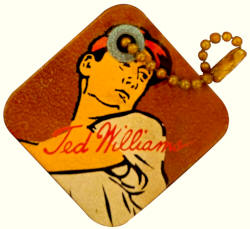 In 1949 and 1950, the Schutter Candy
Co., makers of Old Nick and Bit-O-Honey
candy bars, offered
"Chain Of
Champions" Key Rings. The premiums were
made available for .15¢, and two Old
Nick or Bit-O-Honey candy bars wrappers
(or one of each).
In 1949 and 1950, the Schutter Candy
Co., makers of Old Nick and Bit-O-Honey
candy bars, offered
"Chain Of
Champions" Key Rings. The premiums were
made available for .15¢, and two Old
Nick or Bit-O-Honey candy bars wrappers
(or one of each).
The Key Ring chain came with a baseball charm, and picture tag
illustrating one of six ballplayers:
Joe DiMaggio; Bob Feller; Ted Williams;
Stan Musial; Jackie Robinson; and
Johnny Mize. Illustrated artwork on the
1.5 by 1.5 inch leather picture tabs
were done by renown Sporting News
artist Willard Mullin. A facsimile
autograph accompanies each player.
Wallets, and pencil cases with the same
artwork were also produced which were
sold at stadium souvenir stands.
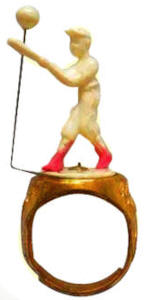 The
Ted Williams Baseball Action Ring
was made available as a premium by
Nabisco in 1948; by mailing in a coupon
with .15 cents, and one box top from
Nabisco Shredded Wheat. The ring is a
gold-color metal with anti-tarnish
finish, and has a plastic batter at the
top. "It Really works....the batter
swings with real World Series form!"
The
Ted Williams Baseball Action Ring
was made available as a premium by
Nabisco in 1948; by mailing in a coupon
with .15 cents, and one box top from
Nabisco Shredded Wheat. The ring is a
gold-color metal with anti-tarnish
finish, and has a plastic batter at the
top. "It Really works....the batter
swings with real World Series form!"
A tab on the base allows the figure to swing the bat when the tab is
turned. The side of the ring has a
crossed bats and ball raised relief
below the Ted Williams autograph. The
ring commonly came in a basic shipping
box along with a letter from Ted
Williams on how to care for your
Nabisco Shredded Wheat "Baseball Action
Ring."
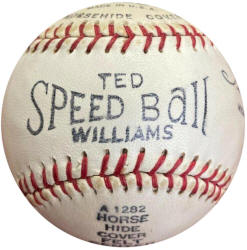 The
Wilson A1282 Ted Williams Speed Ball
was introduced in 1949. The regulation
size, horsehide baseball features a
stamped Ted Williams signature on the
panel to the right of the manufactures
sweet spot, above "Member Wilson
Advisory Board."
The
Wilson A1282 Ted Williams Speed Ball
was introduced in 1949. The regulation
size, horsehide baseball features a
stamped Ted Williams signature on the
panel to the right of the manufactures
sweet spot, above "Member Wilson
Advisory Board."
The ball was listed in the Wilson Sporting Goods catalog, along side the
No. A1090 Ted Williams Autograph League
ball until 1960. The No. A1090 was
changed to "Ted" Williams Autograph
ball, which featured a stamped Ted
Williams signature in 1961.
The earliest balls issued from 1949 to 1954, had "Made in U.S.A." below
the Wilson logo. "Horsehide Cover" was
added below "Made In U.S.A." in 1955.
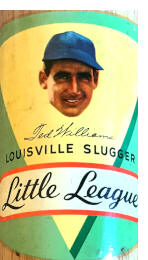 The
No. 125LL 'Genuine Autographed' Little
League Louisville Sluggers were
turned from select air-seasoned
Northern white ash with natural white
finish and hickory with antique brown
finish, Powerized and Oil Tempered. The
125LL baseball bats were first made
available in the 1950 catalog, and came
in four different player models, which
featured full color decals with
pictures and autographs of Joe
DiMaggio, George Kell, Johnny Mize, and
Ted Williams.
The
No. 125LL 'Genuine Autographed' Little
League Louisville Sluggers were
turned from select air-seasoned
Northern white ash with natural white
finish and hickory with antique brown
finish, Powerized and Oil Tempered. The
125LL baseball bats were first made
available in the 1950 catalog, and came
in four different player models, which
featured full color decals with
pictures and autographs of Joe
DiMaggio, George Kell, Johnny Mize, and
Ted Williams.
In the 1954 catalog the 125LL Little League decal bats were offered in six
player models. George Kell, Jackie
Robinson, Mickey Mantle, Ralph Kiner,
Babe Ruth and Ted Williams.
By1959 the 125LL was advertised as the "large-size" Junior bat, as opposed
to the 125J "Medium-Sized" Junior model
and both were signature models without
the decal. In 1954 the 125J also came
with the same decal as the 125LL.
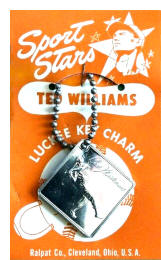 In 1950 the Ralpat Co. of Cleveland
Ohio, issued a series of square-diamond
aluminum
Luckee Key Charm tags that are
holed at the top to accommodate a
beaded chain. Five players on colored
cards included; Ewell
Blackwell-Brown, Bob Feller-Orange,
Ralph Kiner-Blue, Hal Newhouser-Green,
and Ted Williams-Orange. Each charm
depicts an action relief of a player
along with the players facsimile
autograph.
In 1950 the Ralpat Co. of Cleveland
Ohio, issued a series of square-diamond
aluminum
Luckee Key Charm tags that are
holed at the top to accommodate a
beaded chain. Five players on colored
cards included; Ewell
Blackwell-Brown, Bob Feller-Orange,
Ralph Kiner-Blue, Hal Newhouser-Green,
and Ted Williams-Orange. Each charm
depicts an action relief of a player
along with the players facsimile
autograph.
The back of the charm has a good sportsmanship message in the center of
the diamond. at the top reads "GOOD
LUCK" with the two words separated by a
horse shoe. The bottom features crossed
bats with a ball above them.
The blank backed retail card has an
illustrated portrait of each player
with a stars backdrop on the top right
corner. To the left reads "Sports
Stars." Below that has the players
name, then a baseball that reads above
it "LUCKEE KEY CHARM." The sweet spot
of the baseball fhas the player's
facsimile signature.
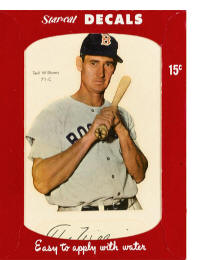 The Meyercord co. of Chicago produced
two sets of Star-Cal baseball player
decals in 1952. The
Type 1 Star-Cal Decal set consists
of 68 different Major League players,
each picturing a single player on a
large 4-1/8 x 6-1/8 decal. There were
two different Ted Williams, and Stan
Musial decals made, bring the total to
70 decals.
The Meyercord co. of Chicago produced
two sets of Star-Cal baseball player
decals in 1952. The
Type 1 Star-Cal Decal set consists
of 68 different Major League players,
each picturing a single player on a
large 4-1/8 x 6-1/8 decal. There were
two different Ted Williams, and Stan
Musial decals made, bring the total to
70 decals.
The other, Type 2, was a 32 card set, and has two players instead of one,
each measuring 4-1/8" x 3-1/16". A
facsimile autograph decal is featured
below each of the player's picture. The
autograph decal was to be cut away from
the picture decal before dipping in
water.
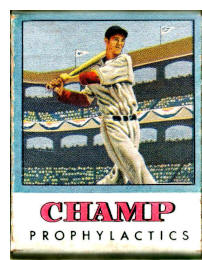 Sometime during the mid 1950's the
National Hygienic Products Corporation,
of New York, marketed
"Champ
Prophylactics." Four different packet
designs were produced, each depicting
"Champs" of four sports, Golf,
Football, Boxing, and baseball.
Sometime during the mid 1950's the
National Hygienic Products Corporation,
of New York, marketed
"Champ
Prophylactics." Four different packet
designs were produced, each depicting
"Champs" of four sports, Golf,
Football, Boxing, and baseball.
The boxing packets are believed to be an artistic likeness of boxer Jack
Dempsey, and the baseball packet Ted
Williams. The unauthorized use of Ted's
image is similar to the one used on his
1954 Topps card #250. Williams never
endorsed or received any royalties from
the Nat. Hygienic Prod's Corp.
But it was reported that he still got a
chuckle out of it when asked to sign a
packet. The product was more than
likely produced between the earlier
part of 1955-1962. Condom advertising
was still in the closet, and illegal
until a Supreme Court decision in 1977.
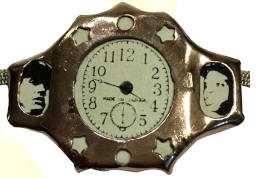 Each of these
novelty "dime-store" toy watches
feature two black-and-white baseball
player photos of twelve of the games
biggest stars. Hank Aaron & Mickey
Mantle - Joe DiMaggio & Stan Musial -
Bob Lemon & Yogi Berra - Jackie
Robinson & Warren Spahn - Ed Mathews &
Roger Maris - Ted Williams & Willie
Mays.
Each of these
novelty "dime-store" toy watches
feature two black-and-white baseball
player photos of twelve of the games
biggest stars. Hank Aaron & Mickey
Mantle - Joe DiMaggio & Stan Musial -
Bob Lemon & Yogi Berra - Jackie
Robinson & Warren Spahn - Ed Mathews &
Roger Maris - Ted Williams & Willie
Mays.
The player photo cardboard backing was inserted from the back, held in
place with four prongs, and an elastic
band made to go around a child’s wrist.
Pictures of the ballplayers show
through two windows, one on each side
of a paper drawing of a clock, on the
tin toy watch face.
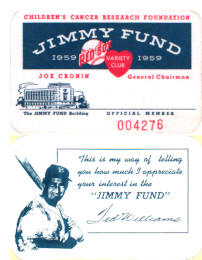 The Jimmy Fund, was founded as a money
raising agency of the Children's Cancer
Research foundation. The Jimmy Fund
started in 1948 when the Variety
Children's Charity of New England and
the Boston Braves baseball team joined
forces to help a 12-year-old cancer
patient dubbed "Jimmy." The Red Sox
formed a partnership and supported the
Jimmy Fund Since 1953.
The Jimmy Fund, was founded as a money
raising agency of the Children's Cancer
Research foundation. The Jimmy Fund
started in 1948 when the Variety
Children's Charity of New England and
the Boston Braves baseball team joined
forces to help a 12-year-old cancer
patient dubbed "Jimmy." The Red Sox
formed a partnership and supported the
Jimmy Fund Since 1953.
In 1956 Ted Williams who backed the fund since it was organized in 1948,
became the general chairman of the
Jimmy fund. His plan was to expand
efforts for the children's cancer
research foundation nation wide.
He made radio and television appearances on behalf of the Jimmy Fund, to
immediately raise funds to enlarge the
cancer research building. Williams
unveiled a
Jimmy Fund Membership card at a
1956 Fenway Park press luncheon. The
card pictures Ted Williams, and
facsimile aerograph on the back.
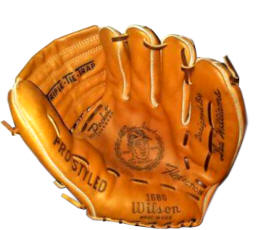 In 1961 Sears issued the Ted Williams
"All Time Award" Wilson 1680 Pro-Styled
signature model baseball glove.
Available only at sears, the glove was
made by Wilson Sporting Goods with the
Sears catalog number 1680.
In 1961 Sears issued the Ted Williams
"All Time Award" Wilson 1680 Pro-Styled
signature model baseball glove.
Available only at sears, the glove was
made by Wilson Sporting Goods with the
Sears catalog number 1680.
As advertised; "Here it is - the glove was designed and autographed by
Ted Williams! ...Sears Salutes A Great
Athlete With All-Time Award Model Glove
and Ball, in autographed picture box
with a Commemorative Medallion"
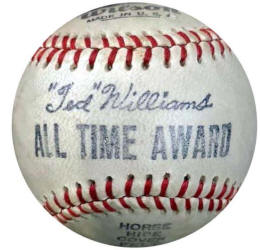 The Wilson 1680 signature model
baseball glove features a deep "U"
shaped one-piece triple trap, deep hand
formed pro-pocket, flex-action hinge,
full streamlined fingers, roll leather
bound, flat padding, lace down little
finger, and thumb.
The Wilson 1680 signature model
baseball glove features a deep "U"
shaped one-piece triple trap, deep hand
formed pro-pocket, flex-action hinge,
full streamlined fingers, roll leather
bound, flat padding, lace down little
finger, and thumb.
The sweet-spot on
the baseball has a "Ted" Williams
autograph stamped above "ALL TIME
AWARD" The panel to the left of the
sweet-spot is stamped "Official" and to
the right is an image of Ted Williams
wearing a Boston Red Sox cap.
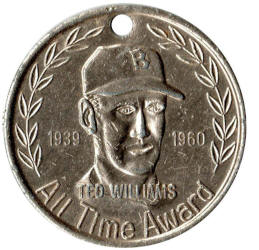 The front of the light metal medallion features in relief, 1939-1960 Ted
Williams with wreath on each side, and
"All Time Award" at the bottom. The top
is punched out for a link chain which
passed through it. The back of the
Medallion features Ted Williams
life-time statistic, and achievements. The front of the light metal medallion features in relief, 1939-1960 Ted
Williams with wreath on each side, and
"All Time Award" at the bottom. The top
is punched out for a link chain which
passed through it. The back of the
Medallion features Ted Williams
life-time statistic, and achievements.
In 1962 Sears
introduced Ted Williams as their new
full-time consultant on sporting goods.
As a promotion, Sears offered a number
of promotional items such as
"Batting Tips From Ted," a Ted
Williams booklet on how to be a better
hitter.
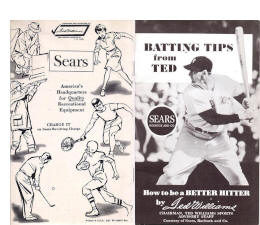 The Ted Williams booklet was offered
free to the first 150 people asking to
see the Ted Williams baseball glove.
The 20 page booklet features a black &
white cover photo of Ted Williams
batting.
The Ted Williams booklet was offered
free to the first 150 people asking to
see the Ted Williams baseball glove.
The 20 page booklet features a black &
white cover photo of Ted Williams
batting.
The inside features; a bio of Ted, tips (with diagrams) on batting
stances, swing and “mental equipment,”
and the new line of Ted Williams
Approved Baseball equipment. Last page
features
an ad for a 20 minute 16mm film Sound-Color Motion Picture; "Batting With
Ted Williams"
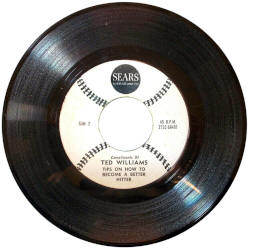 Also Free, accompanied with the
booklet, with a purchase of any Ted
Williams baseball glove, was a 7" vinyl 45 RPM
record, "Tips On How To Become A Better
Hitter," narrated by Ted Williams.
Also Free, accompanied with the
booklet, with a purchase of any Ted
Williams baseball glove, was a 7" vinyl 45 RPM
record, "Tips On How To Become A Better
Hitter," narrated by Ted Williams.
The record,
"Compliments of Ted Williams," covers
Learning the Strike Stone; Batting
Stance; Swing; Practicing your bat
swing; and the
type of bat to use. The record was
released on a Sears Roebuck & Co.
record label which was pressed at
Columbia Records Pressing Plant.
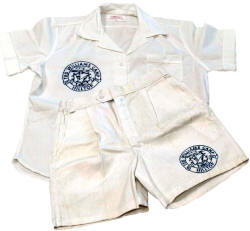 The Ted Williams Baseball Camp for
Boys, located in Lakeville
Massachusetts, opened in 1958, and
closed in 1986. In 1963 The Ted
Williams Baseball Camp was available to
boys, and the Hill Top Camp for Girls,
ages 7 to 17. Separate camps.
The Ted Williams Baseball Camp for
Boys, located in Lakeville
Massachusetts, opened in 1958, and
closed in 1986. In 1963 The Ted
Williams Baseball Camp was available to
boys, and the Hill Top Camp for Girls,
ages 7 to 17. Separate camps.
A complete baseball program for boys, and daily horseback riding for the
girls. There was a private golf course,
swimming, tennis, private tutoring, and
Ted Williams in person. This
Ted Williams Camp uniform consist
of a short sleeve shirt, and pants.
The emblem on both reads "Ted Williams Camp, Hilltop, Girls - Boys, Lakeview
MASS, Integrity" The manufacturers
uniform tag reads Aldrich & Aldrich
Inc. makers of Gymnasium costumes, 65%
Dacron Polyester 35% Cotton, Below is a
space for a name, followed by the size,
18.
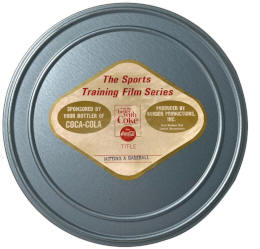 During the 1950s through to the 1970s,
Coca-Cola sponsored a series of sports
training films featuring famous
coaches. Local Coca-Cola distributers
were encouraged to buy the training
films and lend out to high school and
junior high teams or other interested
parties. The 16mm films were produced
by Borden Productions Inc.
During the 1950s through to the 1970s,
Coca-Cola sponsored a series of sports
training films featuring famous
coaches. Local Coca-Cola distributers
were encouraged to buy the training
films and lend out to high school and
junior high teams or other interested
parties. The 16mm films were produced
by Borden Productions Inc.
Borden produce films for several baseball teams; the Red Sox, Kansas City
Athletics, and Detroit Tigers. He also
shot several official World Series
films. Baseball related films also
incluuded:
"Batting and Bunting," and the 12th in the series; "Pitching" with Yale
Coach Ethan Allen. In 1965 Coca-Cola-Boeden
Productions relesed
"Hitting a Baseball" with Ted Williams.
The Red Sox batting instructor at the
time, Williams gives tips on selecting
a bat, grip, stance, position in the
batter's box, hand and wrist action,
timing, pivoting, and reflexes. The
film also shows Williams at the peak of
his playing career.
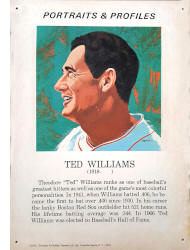 The
Portraits & Profiles series of
educational display cards were
produced by the New York based
publisher Barnell Loft. The large 13
1/2" x 19 1/2" heavy cardboard posters
were distributed to schools to be
displayed in halls, classrooms, and
gymnasiums. The
Portraits & Profiles series of
educational display cards were
produced by the New York based
publisher Barnell Loft. The large 13
1/2" x 19 1/2" heavy cardboard posters
were distributed to schools to be
displayed in halls, classrooms, and
gymnasiums.
Each card had a factory made punch-hole at each corner, and featured a
short biography written by Richard A.
Boning, below a 10"x10" illustration by
artist Joseph Forte. The cards came in
a box set of 8, with different subjects
including the Physical Education series
"Baseball"
The baseball series was issued in two sets of eight ballplayers, including
Ted Williams which was part of set A.
Other players in the series included;
Mickey Mantle, Babe Ruth, Ty Cobb,
Willie Mays, and Leroy “Satchel” Paige.
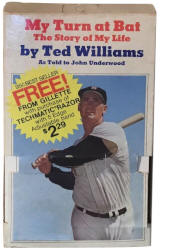 Pocket Books also published a special
edition for Gillette. In a 1970
promotion, when you purchased
Gillette's Adjustable Techmatic Razor,
it came with the
free book, "My Turn At
Bat The Story of My Life" by Ted
Williams.
Pocket Books also published a special
edition for Gillette. In a 1970
promotion, when you purchased
Gillette's Adjustable Techmatic Razor,
it came with the
free book, "My Turn At
Bat The Story of My Life" by Ted
Williams.
The paperback book which reads
"Complements of Techmatic®
by Gillette" at the bottom, came in a
picture box. My Turn at Bat is Ted
Williams' own story of his spectacular
life and baseball career. From his
boyhood days in San Diego, through his
career with the Boston Red Sox, to his
job as manager of the Washing Senators.
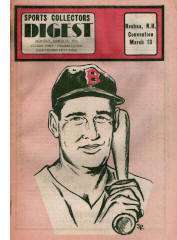 Started up in 1973 by the Stommen
family, SCD - Sports Collectors Digest,
claimed to be the "Voice of the Hobby."
Its the hobby’s oldest, and largest
publication, covering every aspect of
modern sports collecting including
cards, memorabilia, autographed
material and more.
Started up in 1973 by the Stommen
family, SCD - Sports Collectors Digest,
claimed to be the "Voice of the Hobby."
Its the hobby’s oldest, and largest
publication, covering every aspect of
modern sports collecting including
cards, memorabilia, autographed
material and more.
Published twice monthly, the issues in 1976 were smaller, measuring 7-1/8
x 10-3/41, as compared to the newer
issues which measure 11"x 14." Ted
Williams is featured on the cover of
this
March 15, 1976 issue of SCD. The
contents is loaded with classifieds,
and dealer ads.
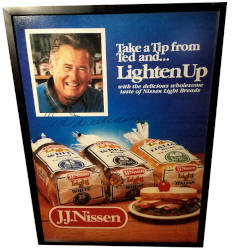 Ted Williams did print and television
ads for J.J. Nissen in the late 1980s.
This large framed advertising poster
would have been distributed to local
area supermarkets that carried
J.J.Nissen Bread. The blue background
poster has a white bordered insert
picture of Ted Williams With a large
facsimile autograph below. To the right
in white lettering reads "Take a Tip
from Ted and....Lighten Up, with the
delicious wholesome taste of Nissen
Light Breads"
Ted Williams did print and television
ads for J.J. Nissen in the late 1980s.
This large framed advertising poster
would have been distributed to local
area supermarkets that carried
J.J.Nissen Bread. The blue background
poster has a white bordered insert
picture of Ted Williams With a large
facsimile autograph below. To the right
in white lettering reads "Take a Tip
from Ted and....Lighten Up, with the
delicious wholesome taste of Nissen
Light Breads"
The bottom left has the J.J. Nissen
company logo just bellow three loafs of
J.J. Nissen Light Bread, and to the
right of the logo a sandwich topped
with a cherry tomato.
During the mid to late 1980's J.J. Nissen also issued a number of "Take a
Tip from Ted" promotional items and a
"Ted's Bread is Nissen Bread" 9"x12"
prints that featured an illustration of
Ted Williams and his facsimile
signature. They also issued a baseball
card set of 20, in 1989 that also
featured Ted Williams and other great
ballplayers of the day.
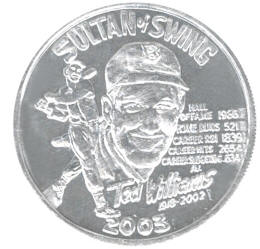 Mardi Gras Doubloons also known as
"throws," commemorate various Mardi
Gras Krewes. They are typically made of
aluminum and thrown from floats in
carnival parades.
Mardi Gras Doubloons also known as
"throws," commemorate various Mardi
Gras Krewes. They are typically made of
aluminum and thrown from floats in
carnival parades.
The first doubloons depicting a Major League ballplayer featured Babe Ruth
in 1967. A hundred Thousand
gold-colored; "Take Me Out to the Ball
Game" themed doubloons were created by
advertising salesman Ed Muniz for the
new Krewe of Endymion.
In the years to come the Mardi Gras throw Doubloons were made of a light
aluminum so when thrown from a float it
would not injure anyone. They were also
made in different colors which
included; gold, yellow, red, blue,
green, purple, etc... Other baseball players
that
were the subject of dedication included;
Mel Ott, Johnny Bench, Dizzy Dean, and
Mickey Mantle. In
2003 a Ted Williams "Sultan Of Swing"
was issued by Krewe of Jefferson.
FAKE! Ted's
Root Beer Cardboard Advertising Sign
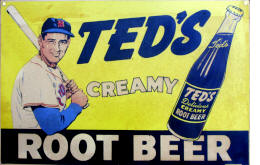 This is a
Fake 1952 Ted's Root Beer
cardboard advertising sign. Ted Williams was
employed by the Moxie Corporation as
Assistant Advertising Manager for a
period of 5 years starting November 1,
1957, at a salary of $1,000 per year,
with an option to buy 50,000 shares in
the company.
This is a
Fake 1952 Ted's Root Beer
cardboard advertising sign. Ted Williams was
employed by the Moxie Corporation as
Assistant Advertising Manager for a
period of 5 years starting November 1,
1957, at a salary of $1,000 per year,
with an option to buy 50,000 shares in
the company.
Source -Moxie Encyclopedia
Volume 1 by Q. David Bowers
This cardboard sign as others that were being sold on
eBay as original has a copyright of
1952... In 1952 Ted Williams was not
promoting Root Beer. After six games in
1952 Williams was called up to active
duty in the Korean War. Williams a
pilot flew combat missions over Korea.
Hit by small-arms fire during one run,
Williams crash-landed his crippled jet
and escaped from the flaming wreckage
as he said "Faster than Mickey Mantle"
He returned after 39 missions in 1953.
|
|
| |
|
|
| |
|
|
| |
KEYMAN COLLECTIBLES
RELATED RESOURCES |
|
| |
|
|
| |
|
|
| |
Half the fun of
collecting is showing off your collection to
others. Lets See your Room! |
|
| |
|
|
| |
Showcase
your collection on KeyMan Collectibles for Free!.
Just send pictures, and
Get Your Collectors Showcase Room Now! |
|
| |
|
|
| |
KeyMan
Collectibles Collectors Corner
- Keep up with the latest collecting news,
announcements, and articles of interest on the
webs best resource for baseball memorabilia. |
|
| |
KeyMan Collectibles Baseball
Memorabilia Facebook Group -
Post Questions and comments relating to
Baseball Collectibles and Memorabilia. Interact
with other collectors or show off your
collection. |
|
| |
KeyMan
Collectibles Forum
- A great option for those that "Don't do
facebook" Post Questions and
comments relating to Baseball Collectibles and
Memorabilia |
|
|

